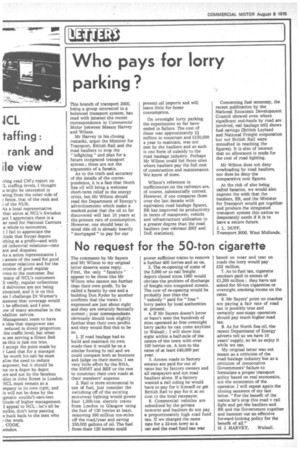No request for the 50-ton cigarette
Page 34

If you've noticed an error in this article please click here to report it so we can fix it.
The comments by Mr Sayers and Mr Wilson to my original letter deserve some reply. • First, the only " fanatics" appear to be those like Mr Wilson who cannot see further than their own profit. To be called a fanatic by one and a budding Don Ryder by another confirms that the views I expressed are just about right and they are certainly factually correct; your correspondents obviously should look slightly further than their own profits and they would find this to be so.
1. If road haulage had to build and maintain its own roads then it would be on a similar footing to rail and we could compare both as business and judge on their merits, I see very little effort by the RHA, the SMMT and BRF or the rest to construct their own toads at their members' expense.
2. Rail is more economical in use of fuel, just consider the switching off of the existing motorway lighting would power four 1,000-ton electric trains from London to Glasgow using the fuel of 120 lorries at least, removing 500 million ton-miles off the road/year and saving 350,000 gallons. of oil. The fuel from their 120 lorries could power sufficient trains to remove a further 400 lorries and so on.
3. The re-opening of some of the 5,000 or so rail freight depots closed since 1960 would obviate the problem of discharge of freight into congested streets. The cost of reeDpereng would be probably less than the subsidy" paid for "free " lorry parks by local authorities at present.
4. If Mr Sayers doesn't know or hasn't seen the hundreds of sites operated as free overnight lorry parks he can come anytime to Walsall ; I will show him eight within a half-mile of the centre of 'the town with over 100 lorries on. A loss to the cares of at least £40,000 per year.
5. Access roads to factory estates are paid for out of rates but by factory owners and all ratepayers :and not road hauliers alone. If a factory wanted e rail siding he would have to pay for it himself or get British Rail to pay for it at no cost to the local ratepayer.
6. Commercial vehicles are subsidised by the private motorist and hauliers do not pay a proportionately high road fund tax. If we charged the same rate for a 32-ton lorry as a car and the road fund tax was based on wear and tear on roads the lorry would pay £32 million.
7. As to fuel tax, cigarette smokers paid in excess of £1,200 ; they have not asked for 50-ton cigarettes or overnight smoking rooms on the rates.
8. Mr Sayers' point on coaches not paying a fair rate of road tax is possibly true and certainly non-stage operators should pay much higher road tax.
9. As for North Sea oil, the recent Department of Energy adverts tell us we have 10 years' supply, so let us enjoy it while we can.
My original letter was not meant as a criticism of the road haulage industry but as a criticism of consecutive Governments' failure to formulate a proper transport policy based on real economics, not the economics of the operator. I will repeat again the closing sentence of my last letter. "For the benefit of the nation let's stop this road v rail fight and get the hauliers and BR and the Government together and hammer out an effective forward-looking policy for the benefit of all."
H. J. HARVEY, Walsall.




































































































